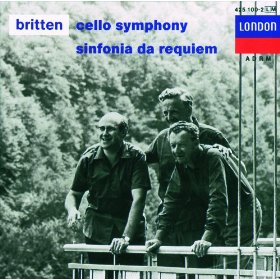Britten: Orchestral & Vocal Works
View record and artist detailsRecord and Artist Details
Composer or Director: Benjamin Britten, Mstislav Rostropovich
Genre:
Orchestral
Label: London
Magazine Review Date: 9/1989
Media Format: CD or Download
Media Runtime: 75
Mastering:
ADD
Catalogue Number: 425 100-2LM

Tracks:
| Composition | Artist Credit |
|---|---|
| Symphony for Cello and Orchestra |
Benjamin Britten, Composer
Benjamin Britten, Composer Benjamin Britten, Conductor English Chamber Orchestra Mstislav Rostropovich, Composer |
| Sinfonia da Requiem |
Benjamin Britten, Composer
Benjamin Britten, Composer Benjamin Britten, Conductor New Philharmonia Orchestra |
| Cantata misericordium |
Benjamin Britten, Composer
Benjamin Britten, Conductor Benjamin Britten, Composer Dietrich Fischer-Dieskau, Baritone London Symphony Chorus London Symphony Orchestra Peter Pears, Tenor |
Author:
It cannot be denied, good as the recent recordings of Britten's Cello Symphony have been (Yo-Yo Ma on CBS outstandingly good), interestingly varied though the interpretations of this elusive work are, the composer's own recording with Rostropovich, here transferred triumphantly to CD, surpasses them all. Under his direction, its tragic brooding, angry intensity and final, slightly unconvincing Jubilation coalesce into a compelling and sombre experience. He made the ECO play with an almost tangible tension.
Then, of course, there is Rostropovich himself. It is not merely his big tone, dictating terms and dominating climaxes, but that steely, precise pizzicato and the wonderful pianissimo playing. In the quiet sections he and Britten conspire together to create an extraordinary atmosphere of mystery and imminent tragedy. When the almost vulgar trumpet tune erupts in the finale, the release of tension is phenomenal. Perhaps, if one is to be hypercritical, the orchestral playing is occasionally ragged, but the whole point of this performance is that one senses that this is how the music sounded in its creator's mind and for that reason alone this recording is a pearl without price.
Britten's interpretation of his youthful Sinfonia da Requiem is also to be cherished. Simon Rattle's on EMI is more dramatic and better played, with a wider dynamic range and clearer detail, but the composer's performance has insights to which only he had the key and a clarification of the texture that shows how lovingly he regarded this memorial to his parents. The third work on this indispensable disc is the Cantata misericordium, a setting of the parable of the Good Samaritan, written to mark the centenary of the Red Cross. It is a spin-off from the War Requiem and I am not sure how durable occasional pieces like this will prove to be. But that was not Britten's concern when he composed it—''to be useful and to the living'' was his motto—and with the original soloists, Pears and Fischer-Dieskau, this performance presents the music in its best light.'
Then, of course, there is Rostropovich himself. It is not merely his big tone, dictating terms and dominating climaxes, but that steely, precise pizzicato and the wonderful pianissimo playing. In the quiet sections he and Britten conspire together to create an extraordinary atmosphere of mystery and imminent tragedy. When the almost vulgar trumpet tune erupts in the finale, the release of tension is phenomenal. Perhaps, if one is to be hypercritical, the orchestral playing is occasionally ragged, but the whole point of this performance is that one senses that this is how the music sounded in its creator's mind and for that reason alone this recording is a pearl without price.
Britten's interpretation of his youthful Sinfonia da Requiem is also to be cherished. Simon Rattle's on EMI is more dramatic and better played, with a wider dynamic range and clearer detail, but the composer's performance has insights to which only he had the key and a clarification of the texture that shows how lovingly he regarded this memorial to his parents. The third work on this indispensable disc is the Cantata misericordium, a setting of the parable of the Good Samaritan, written to mark the centenary of the Red Cross. It is a spin-off from the War Requiem and I am not sure how durable occasional pieces like this will prove to be. But that was not Britten's concern when he composed it—''to be useful and to the living'' was his motto—and with the original soloists, Pears and Fischer-Dieskau, this performance presents the music in its best light.'
Discover the world's largest classical music catalogue with Presto Music.

Gramophone Digital Club
- Digital Edition
- Digital Archive
- Reviews Database
- Full website access
From £8.75 / month
Subscribe
Gramophone Full Club
- Print Edition
- Digital Edition
- Digital Archive
- Reviews Database
- Full website access
From £11.00 / month
Subscribe
If you are a library, university or other organisation that would be interested in an institutional subscription to Gramophone please click here for further information.




